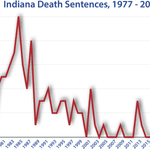
State & Federal
Indiana

History of the Death Penalty
The death penalty has been present in Indiana for much of the state’s history. Death penalty laws were part of Indiana’s legislation and culture even before Indiana was granted statehood in 1816. Hangings were fairly frequent in the 1800’s, and in some cases public hangings resulted in violent mobs that killed the inmate even before they were hung. This changed with the introduction of the electric chair, which became the primary method of execution in 1913. The death penalty is still used, but executions have been limited in number since reinstatement in 1978, with less than 25 executions.
Timeline
1816 — Indiana is granted statehood. Death penalty laws were apart of Indiana territory-culture and legislature prior to statehood.
1913 — The electric chair becomes the primary method of execution in Indiana. Previously, hanging was the primary method of execution.
1961 — Richard Kiefer is the last person executed prior to a moratorium on the death penalty in 1972.
1973 — The Indiana General Assembly enacts a new death penalty sentencing statute to replace the legislation struck down by the U.S. Supreme Court in Furman v. Georgia.
1977 — The Indiana Supreme Court strikes down Indiana’s 1972 death penalty sentencing scheme in response to the court’s decision in Woodson v. North Carolina. Eight men on Indiana’s death row have their sentences set aside as a result.
1985 — William Vandiver’s electrocution execution is botched. After the first administration of 2,300 Volts, Vandiver was still breathing, and Herbert Shaps, Vandiver’s attorney, observed smoke and the smell of burning upon witnessing Vandiver’s execution.
1986 — At sixteen years old, Paula Cooper is the youngest person to be sentenced to death in Indiana.
1995 — Gregory Resnover is the last person to be put to death by electrocution in Indiana.
1995 — The Indiana Legislature passes and the governor signs a law making lethal injection the primary method of execution in Indiana.
1996 — Tommie Smith’s execution is botched in Indiana’s first execution by lethal injection. It took one hour and nine minutes for Smith to be pronounced dead after the execution team struggled to find adequate veins.
2002 — Governor Frank O’Bannon signs SB 426, making Indiana the 16th state to forbid the death penalty for those who were 18 years-of-age at the time of their crime.
2014 — Indiana officials decide to switch to the drug Brevital in their lethal injection process due to a shortage of sodium thiopental.
2017 — The Indiana Court of Appeals voids the state’s lethal-injections protocol, holding that Indiana’s Department of Corrections had failed to comply with state rulemaking procedures when it adopted a never-before-used execution protocol without public notice or comment.
2020 — The first federal execution in 17 years is carried out in Indiana. A 5 – 4 Supreme Court ruling cleared the way for the execution of Daniel Lewis Lee at the United States Penitentiary, Terre Haute.
2021 — The Indiana Supreme Court requires the Indiana Department of Corrections to release documents regarding efforts to obtain lethal injection drugs and orders the department to pay more than a half million dollars in attorney fees for its bad faith non-compliance with the state’s public records act.
2024 — After a 15-year hiatus, Indiana announced plans to resume executions on December 18, 2024. Joseph Corcoran, the man scheduled to be executed, is severely mentally ill and waived his appeals.
Famous Cases
Debra Denise Brown, along with Alton Coleman, was convicted for raping, robbing and murdering several victims throughout the summer of 1984. Both Brown and Coleman were sentenced to death in Indiana and Ohio. Brown’s death sentence in Ohio was commuted to life without parole largely due to questions raised about her intellectual functioning and mental ability, as well as the dependency on Coleman to commit the crimes. The same concerns led to her Indiana death sentence being modified to a 140-year sentence. Her partner, Coleman, was executed in 2002.
Notable Exonerations
In 1978, Larry Hicks was sentenced to death for the stabbings of Norton Miller and Stephen Crosby at a neighbor’s party. He was seen earlier threatening the two individuals with a knife. The Playboy Foundation became interested in Hicks’ claim of innocence and granted Hicks money for a retrial after he passed a lie detector test. He was granted a retrial based on ineffective representation at his first trial, and the conviction was overturned once eyewitnesses recanted their testimonies and Hicks provided an alibi. He was released from death row in 1980 and cleared of charges.
Notable Commutations/Clemencies
Arthur Baird’s story is an example of how mental illness can impact death penalty cases. Baird strangled his wife, Nadine Baird, killing her and their unborn child in 1985. The next morning he went on to stab his parents, Arthur and Kathryn Baird. The unusual circumstances surrounding his case, including holding his dead wife for hours in front of a television and feeding his chickens and receiving a haircut before killing his parents, raised questions about Baird’s sanity. Although the Board of Paroles denied his petition for clemency, Governor Mitch Daniels granted Baird clemency on August 9, 2009, the day before his scheduled execution.
Other Interesting Facts
Over time, Indiana has utilized three methods of execution. Until 1913, hanging was the primary method of execution for those sentenced to death. Electrocution was then used until 1995, when lethal injection was first used. Lethal injection is the current primary method of execution in Indiana.
According to Indiana codes, the execution of a death row inmate must take place before sunrise on the execution day.
On July 1, 2002, Indiana shifted away from sentencing in death penalty cases with a judge towards sentencing with a jury. The judge is only to get involved should the jury not unanimously agree on the death sentence.

Resources

Indiana Execution Totals Since 1976
News & Developments
News
Oct 30, 2025
Low Death Sentencing, Lack of Deterrence, and High Costs Raise Questions Over Capital Punishment in Indiana
Indiana’s seemingly paradoxical resumption of executions, with three over the last year, is drawing scrutiny from many corners of the state. Governor Mike Braun, legislators from both political parties, public defenders and even prosecutors have raised questions about the costs of prosecuting capital cases and obtaining drugs for executions; the failure of capital punishment to deter crime; and the increasing reluctance of Indiana juries to sentence…
Read MoreNews
Oct 09, 2025
Indiana’s Scheduled Third Execution After 15-year Pause Raises Cost and Secrecy Concerns
Indiana is set to execute Roy Lee Ward on October 10, 2025, despite ongoing concerns about the cost of lethal injection and the lack of transparency surrounding the state’s execution protocols in the wake of a suspected botched execution earlier this year. Mr. Ward will be the third individual executed after a 15-year pause in executions in Indiana. In July 2025, Governor Mike Braun said he would not renew the state’s supply of lethal injection drugs, noting the…
Read MoreNews
Oct 08, 2025
Upcoming Executions Illustrate Persistent Themes and Concerns Around the Death Penalty
October 9, 2025 UPDATE: On October 9, 2025, just a week before his scheduled execution, the Texas Court of Criminal Appeals (CCA) granted Robert Roberson a stay of execution and remanded his case to the district court for further consideration of his request for relief based upon relief offered in a similar case, Ex parte Roark. Like Mr. Roberson’s case, Ex parte Roark**, also involved a conviction based the now…
Read MoreNews
Jun 16, 2025
Governor Says Indiana Will Not Purchase More Lethal Injection Drugs, Invites Debate over Death Penalty
According to Governor Mike Braun (pictured), Indiana has depleted the supply of pentobarbital it uses in its lethal injection executions. Given that the last of the doses purchased in December 2024 expired and went unused, Gov. Braun does not intend to renew the state’s supply. According to earlier reporting by the Indiana Capital Chronicle, the Indiana Department of Correction (IDC) spent $900,000 on pentobarbital in late 2024 in preparation for the execution of…
Read MoreNews
May 22, 2025
“Violent” Movements During Indiana Execution Raise Unanswered Questions
Benjamin Ritchie’s execution in Indiana on May 20, 2025, has raised new concerns about the use of pentobarbital after defense counsel reported their client displayed an unusual physical reaction after being injected with the drug. But because Indiana officials bar media witnesses from observing executions, the public has no independent witness reports on what transpired. Steve Schutte, an attorney for Mr. Ritchie, told the Indiana Capital Chronicle that Mr. Ritchie…
Read More